Pennsylvania prisons: Breeding grounds for coronavirus
Philadelphia
When the coronavirus first became a global pandemic in the spring of 2020, there were widespread demands, met with promises from state officials, to release particularly vulnerable incarcerated workers. Some states and municipalities did release people, but never in the numbers the situation warranted.
In April, protesters in Philadelphia called for prisoners to be released due to COVID-19 surge.

In April, protesters in Philadelphia called for prisoners to be released due to COVID-19 upsurge.
Credit: Joe Piette
Instead of broad releases, prison officials in Pennsylvania instituted draconian lockdowns where prisoners daily spent 23 hours in cells and were given only 45 minutes per day to shower, make phone calls or get fresh air. In person visits were stopped, and access to libraries, commissaries and other programs were strictly curtailed. Exercise and hot meals ended.
While until recently, only 160 cases of COVID-19 were reported among the incarcerated workers, these restrictive measures never applied to the guards and prison staff, who appear to be the ones bringing COVID-19 into the prisons.
Fast forward six months, and prisons, including those in Pennsylvania, are facing a deadly full-blown resurgence of COVID-19 among those incarcerated as well as staff. The result has been outbreaks of COVID-19 in 21 of the 23 state prisons. As of Nov. 12, there have been 17 reported deaths of incarcerated people. At least 442 prisoners and 244 staff have tested positive. According to the Department of Corrections, when staff have requested testing, more than half are positive for the coronavirus. Testing of staff is not mandatory. (Philly.com, Nov. 12)
Rather than release more people or make staff testing mandatory, PADOC officials have responded by moving prisoners who test positive to other prisons or isolation units within a prison. The lockdown policies have been kept in place for over seven months now, amounting to mass torture for the over 46,000 incarcerated workers.
The DOC is also limiting testing for incarcerated workers to those facilities with larger outbreaks. In State Correctional Institution Chester just outside Philadelphia, as of Nov. 10, half of prisoners’ test results and 90% of staff tests were positive. Incarcerated workers there are reporting that prison officials are passing out power of attorney and property release forms in anticipation of more deaths. The 943 men in Chester are only tested if they have a fever, even when many are experiencing other classic COVID-19 symptoms.
The crisis is not limited to state prisons. A recent court filing by U.S. attorneys reported 80 prisoners and eight staff tested positive at the Federal Detention Center in Philadelphia. At the Federal Corrections Institution at Fort Dix, in nearby New Jersey, 150 men out of 220 in one unit tested positive.
As far as numbers in county jails, Claire Shubik-Richards, executive director of the Pennsylvania Prison Society said: “We don’t know, because our county governments aren’t telling us, and that is astounding.” (Philly.com, Nov. 12)
The consistent refusal by prison officials to release at-risk incarcerated workers, and to even provide basic PPE and other preventative items, amounts to the cruel and unusual punishment expressly forbidden by the Eighth Amendment to the U.S. Constitution. It is turning every sentence into a death sentence with no chance of appeal.

